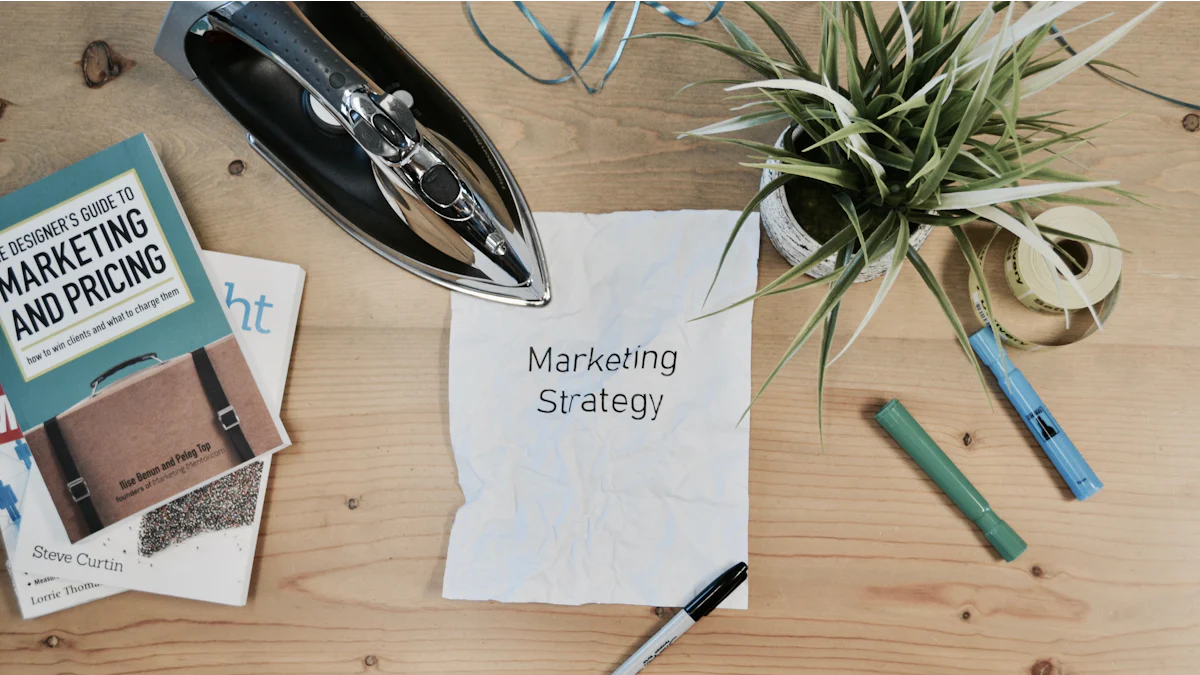Understanding the Pros and Cons of AI in Marketing Automation

AI has transformed how businesses approach marketing automation. It offers tools that streamline processes, improve customer engagement, and deliver data-driven insights. Over 55% of marketers are already using or considering AI in their strategies, with 61.4% leveraging it for automated marketing. However, understanding the pros and cons of this technology is essential. While AI for marketing automation boosts efficiency, it also raises concerns about creativity, privacy, and ethical use. By exploring these aspects, you can make informed decisions and maximize its potential responsibly.
What Is AI for Marketing Automation?
Defining AI in Marketing Automation
AI for marketing automation refers to the use of artificial intelligence technologies to improve the efficiency of marketing campaigns. It analyzes large data sets to uncover patterns and predict customer behavior. By integrating AI and machine learning, marketing automation tools can streamline tasks, enabling real-time decision-making and delivering better results. For example, AI-powered marketing systems can identify trends in customer preferences and adjust campaigns accordingly. This approach allows you to focus on strategy while the technology handles repetitive tasks.
Why AI Matters in Modern Marketing
AI plays a crucial role in modern marketing because it helps businesses stay competitive in a fast-paced digital world. It enables you to process vast amounts of data quickly, providing insights that would take humans much longer to uncover. AI-powered marketing tools optimize processes, ensuring that your campaigns reach the right audience at the right time. Technologies like machine learning, natural language processing (NLP), and predictive analytics allow you to anticipate customer needs and deliver personalized experiences. These capabilities make AI an essential component of any forward-thinking marketing strategy.
Common Applications of AI in Marketing
AI in marketing offers a wide range of applications that can transform your campaigns. Here are some of the most common uses:
- Refining market segmentation through machine learning to gain detailed audience insights.
- Automating tasks like email campaigns and ad bidding to save time and resources.
- Using predictive analytics to anticipate customer behavior and optimize strategies.
Additionally, AI enhances lead generation, customer relationship management, and outreach programs. It also supports content creation by generating human-like articles and curating smart content to engage visitors. Voice search, another AI-powered marketing innovation, impacts SEO strategies, requiring you to adapt to this evolving technology. Real-world examples, such as Nutella’s AI-designed packaging or Volkswagen’s predictive analysis for dealerships, highlight how AI can drive impressive results across industries.
The Pros of AI in Marketing Automation

Boosting Efficiency and Productivity
AI significantly enhances efficiency in marketing operations by automating repetitive tasks. It handles time-consuming activities like email campaigns, social media scheduling, and data analysis. This automation saves time and allows you to focus on strategic initiatives. For example, AI-powered marketing tools analyze large datasets quickly, minimizing errors and improving decision-making speed. These tools also provide actionable insights to optimize campaigns, leading to better ROI.
Here are some measurable outcomes of using AI to boost productivity:
| Measurable Outcome | Description |
|---|---|
| Increased Efficiency | Automates routine tasks, reducing time and effort for employees. |
| Better Resource Allocation | Optimizes processes for more effective use of resources. |
| Enhanced Decision-Making Capabilities | Analyzes data to provide insights for better, data-driven decisions. |
By streamlining operations, AI ensures increased efficiency and productivity, making it an essential tool for modern marketing.
Enhancing Personalization and Customer Experience
AI marketing excels at delivering enhanced personalization. It uses technologies like natural language processing (NLP) and machine learning to understand individual customer preferences and behaviors. By analyzing customer data, AI customizes offers and predicts buying patterns, increasing sales and conversion rates. Personalization fosters loyalty by creating tailored profiles and automating campaigns to deliver relevant content at the right time.
For instance, AI-powered marketing tools like Zendesk Advanced AI have improved customer satisfaction scores and reduced response times for companies like Unity and Esusu. These tools ensure that customers receive timely and personalized support, enhancing their overall experience.
With AI, you can create meaningful connections with your audience, ensuring improved customer insights and satisfaction.
Reducing Costs and Optimizing Resources
AI offers substantial cost-saving benefits in marketing automation. It reduces manpower costs by automating repetitive tasks, allowing your team to focus on creative and strategic areas. AI also optimizes resource allocation by identifying high-performing campaigns and directing budgets to the most effective channels. Predictive analytics further enhances this process by analyzing historical data to identify successful initiatives.
For example, Armor VPN used predictive analytics to refine its user acquisition strategy, ensuring precise budget allocation between high- and low-performing campaigns. Additionally, AI chatbots provide 24/7 customer service, reducing staffing needs while improving customer satisfaction.
By implementing AI in marketing automation, you can achieve cost efficiency, optimize resources, and maximize ROI, making it one of the key advantages of AI in marketing.
Gaining Advanced Data Insights and Predictive Analytics
AI empowers you to unlock advanced data insights that transform your marketing strategies. By analyzing vast datasets, AI reveals patterns and trends that would otherwise remain hidden. These insights allow you to make informed decisions and refine your campaigns in real time. For example, AI performs segmentation analysis to identify active customer groups and tracks content interactions to guide future strategies. It also uses sentiment analysis to gauge customer feedback and behavioral predictions to anticipate preferences.
Tip: Use AI-driven insights to understand your audience better and create campaigns that resonate with them.
AI marketing analytics enhances your ability to interpret data through intuitive graphs and visualizations. You can filter and drill down into specific metrics effortlessly, uncovering detailed insights. Predictive analytics, powered by AI, takes this a step further by forecasting future trends based on historical data. This capability helps you stay ahead of market changes and adapt your strategies proactively.
Predictive analytics also optimizes decision-making. It reduces guesswork by providing accurate insights, enabling you to allocate resources effectively. For instance, AI-powered marketing tools analyze customer behavior to predict future actions. This allows you to tailor your campaigns to individual preferences, increasing engagement and conversions. Predictive segmentation identifies smaller customer groups, while dynamic segmentation updates these groups in real time as behaviors change.
Here’s how AI impacts your marketing decisions:
- Enhances decision-making by delivering actionable insights.
- Increases efficiency by processing large datasets quickly.
- Personalizes campaigns to match customer preferences.
- Forecasts long-term trends to guide strategic planning.
AI in marketing automation ensures you can refine your strategies continuously. By leveraging these advanced insights, you maximize ROI and build stronger connections with your audience.
The Cons of AI in Marketing Automation
Data Privacy and Security Risks
AI-powered marketing tools rely heavily on data collection to deliver personalized experiences. However, this reliance introduces significant risks to data privacy and security. As you use AI for marketing automation, you must consider how it impacts customer privacy rights. AI systems often collect and process vast amounts of personal data, which increases the risk of misuse or exposure to unauthorized parties. For example, high-profile incidents like the Cambridge Analytica scandal highlight how aggressive data collection can lead to privacy violations.
One major concern is informational privacy. AI systems continuously gather granular data, which could expose sensitive customer information if not properly managed. To mitigate these risks, you should implement robust security measures. These include encrypting AI training data, enhancing endpoint security, and conducting threat modeling exercises to identify vulnerabilities. Promoting security awareness among your team also helps protect customer data and maintain trust.
Limited Creativity and Emotional Connection
AI excels at analyzing data and automating repetitive tasks, but it struggles with creativity and emotional intelligence. While AI-powered marketing tools can generate ideas, they cannot replicate the depth of human creativity. You bring unique insights and emotional connections to your campaigns that AI cannot match. Crafting messages that evoke genuine emotions remains a human strength.
AI in marketing often focuses on recognizing patterns, but true innovation requires breaking those patterns. Over-reliance on AI for routine tasks may reduce the time and resources available for creative brainstorming. While AI can assist in scaling campaigns, it cannot replace the originality and empathy that human marketers provide. Balancing AI with human creativity ensures your campaigns remain engaging and emotionally resonant.
Over-reliance on AI Technology
Dependence on AI in marketing can lead to unintended consequences. Over-reliance may reduce critical thinking and strategic skills among marketers. When you rely too heavily on AI outputs, you risk falling into groupthink, where decisions go unquestioned. This can undermine your ability to adapt and innovate.
AI-powered marketing tools are valuable, but they should complement your expertise rather than replace it. By maintaining a balance, you ensure that your team retains its ability to think strategically and creatively. Diversifying your approach prevents over-dependence and keeps your marketing strategies dynamic and effective.
Ethical Concerns and Algorithmic Bias
AI in marketing automation raises several ethical concerns that you must address to maintain trust and fairness. One major issue is algorithmic bias. AI systems rely on data to make decisions, but if the data is incomplete or unbalanced, the algorithms can produce biased outcomes. For example, underrepresented groups in the data may face unfair treatment in targeted campaigns. This can harm your brand's reputation and alienate customers. The controversy surrounding facial recognition technology highlights how biased AI can lead to public backlash and loss of trust.
Transparency is another critical concern. Many consumers find AI operations opaque, which can create skepticism about how their data is used. You should clearly communicate your data collection and decision-making processes to build trust. For instance, explain how AI personalizes campaigns or predicts customer behavior. Transparency ensures that your audience feels informed and respected.
Data privacy also plays a significant role in ethical AI use. AI systems often collect large amounts of personal information to deliver personalized experiences. Mishandling this data can lead to privacy violations and legal consequences. To address this, you should prioritize responsible data handling. Encrypt sensitive information, limit access to authorized personnel, and regularly audit your systems for vulnerabilities.
To promote ethical AI practices, consider these steps:
- Obtain informed consent from customers before collecting their data.
- Regularly test your AI systems to identify and reduce biases.
- Use high-quality, diverse data to ensure accurate and fair outcomes.
By addressing these ethical concerns, you can use AI responsibly while maintaining customer trust and loyalty.
Balancing AI and Human Expertise in Marketing

Identifying the Right Tasks for AI
To maximize the benefits of AI in marketing, you need to identify tasks that are best suited for automation. Start by conducting a data audit to evaluate the quality and scope of your existing data. This helps uncover areas where AI can improve accuracy and efficiency. Analyze repetitive tasks, such as email scheduling or data entry, that consume time but add little creative value. Reviewing past performance can also reveal processes that AI could enhance. For example, AI can optimize ad bidding or segment audiences more effectively.
| Criteria | Description |
|---|---|
| Data Audit | Reviewing existing data to uncover areas for automation and accuracy improvement. |
| Task Analysis | Identifying repetitive tasks that can be automated to save time. |
| Performance Review | Analyzing past performance to find processes that could benefit from AI. |
| Feedback Loop | Gathering input from the marketing team on workflow challenges. |
By assigning the right tasks to AI, you free up your team to focus on strategic and creative efforts.
Leveraging Human Creativity and Emotional Intelligence
AI excels at processing data and optimizing campaigns, but it cannot replicate human creativity or emotional intelligence. You bring unique insights and emotional depth to your marketing strategies. While AI handles mundane tasks, you can focus on crafting messages that resonate with your audience. For example, 74% of senior marketers believe that human creativity and intuition will never be replaced by AI.
- AI enhances the consumer journey through hyperpersonalization, driving brand loyalty.
- It allows you to focus on strategic planning and creative direction.
- Collaboration between AI tools and human marketers produces innovative outputs.
"Taking the bold step to embrace it as a partner—not a replacement—requires courage, but the rewards are immense. Human insight remains the guiding force, ensuring that technology enhances creativity rather than diminishing it."
Campaigns like Netflix’s AI-powered chatbot or Coca-Cola’s AI-generated bottle designs show how combining AI with human creativity can deliver exceptional results.
Promoting Ethical and Transparent AI Use
Ethical and transparent AI use builds trust and credibility with your audience. Start by sourcing high-quality data that represents your target audience. Explain how AI-driven decisions are made to ensure transparency. Always obtain informed consent before collecting personal data. Implement unbiased algorithms to promote fairness in your campaigns.
- Quality data sourcing: Use accurate and representative data.
- Transparency in AI operations: Provide clear explanations for AI-driven decisions.
- Informed consent: Seek permission before collecting personal information.
- Unbiased algorithms: Strive for fairness and inclusivity.
| Benefit | Description |
|---|---|
| Builds Trust | Customers feel informed and trust AI-driven decisions |
| Fosters Loyalty | Transparency leads to increased satisfaction and loyalty |
| Establishes Credibility | Businesses build credibility through transparency |
By prioritizing ethical practices, you strengthen customer relationships and ensure responsible AI use.
Building Customer Trust Through Data Privacy
Building trust with your customers starts with protecting their data. When you use AI in marketing, you rely on personal consumer information to deliver tailored experiences. However, this reliance increases the risk of data misuse. To maintain trust, you must prioritize data privacy and security while balancing personalization with ethical data management.
Start by understanding the regulations that govern data privacy in your industry. Research existing laws and work with legal counsel to ensure compliance. Make sure your customers know how their data is being used and give them the option to opt out of personalized recommendations. Developing clear data governance protocols with your partners also strengthens your privacy practices. Regular audits of your AI systems help prevent unauthorized access and ensure your processes remain secure.
You can take additional steps to protect consumer identities. Anonymizing data ensures that sensitive information cannot be traced back to individuals. Robust encryption methods safeguard data during storage and transmission. By regularly auditing your security protocols, you can identify vulnerabilities and address them before they become issues.
Prioritizing data privacy has a direct impact on customer trust and loyalty. It enhances your brand’s reputation and fosters stronger relationships with your audience. Customers who feel their data is safe are more likely to stay loyal, increasing retention rates. This commitment to privacy also gives you a competitive edge in the marketplace.
By implementing these strategies, you show your customers that their privacy matters. This builds trust and positions your brand as a responsible and ethical leader in AI-driven marketing.
AI in marketing automation offers significant benefits, such as improving efficiency, enhancing personalization, and providing advanced data insights. However, challenges like data privacy risks, limited creativity, and ethical concerns require careful consideration. You must balance AI with human expertise to achieve the best results. While AI handles repetitive tasks and data analysis, your creativity and emotional intelligence ensure meaningful connections with your audience.
When used responsibly and ethically, AI becomes a powerful tool that transforms marketing strategies. By combining its capabilities with your unique skills, you can create campaigns that are both innovative and impactful.
FAQ
What is the biggest advantage of using AI in marketing automation?
AI saves time by automating repetitive tasks like email scheduling and data analysis. It also provides actionable insights from large datasets, helping you make better decisions. This combination of efficiency and intelligence allows you to focus on creative strategies that drive results.
How can you ensure ethical AI use in marketing?
You can ensure ethical AI use by sourcing high-quality, unbiased data and being transparent about how AI makes decisions. Always obtain customer consent before collecting data. Regularly test your AI systems to identify biases and maintain fairness in your campaigns.
Does AI replace human creativity in marketing?
No, AI cannot replace human creativity. It excels at data analysis and automation but lacks emotional intelligence and originality. You bring unique insights and empathy to your campaigns. Combining AI with your creativity ensures engaging and innovative marketing strategies.
How does AI impact data privacy in marketing?
AI relies on personal data to deliver personalized experiences, which increases privacy risks. You must prioritize data security by encrypting sensitive information and complying with privacy regulations. Transparent practices and regular audits help protect customer trust and prevent misuse.
Can small businesses benefit from AI in marketing?
Yes, small businesses can benefit from AI by automating tasks like social media management and email campaigns. AI tools also provide affordable insights into customer behavior, helping you optimize strategies. Many AI-powered platforms offer scalable solutions tailored to smaller budgets.
See Also
Key Influencer Marketing Insights for Enhanced Strategic Planning
Evaluating the Benefits and Drawbacks of Influencer Marketing Returns
Exploring Influencer Whitelisting: Advantages and Disadvantages Explained
Analyzing the Advantages and Disadvantages of TikTok Influencer Campaigns
Exploring Product Seeding Strategies in Contemporary Marketing Approaches
